高中译林牛津英语模块二Unit1grammar
牛津译林版英语必修二Unit1Grammarandusage2教案
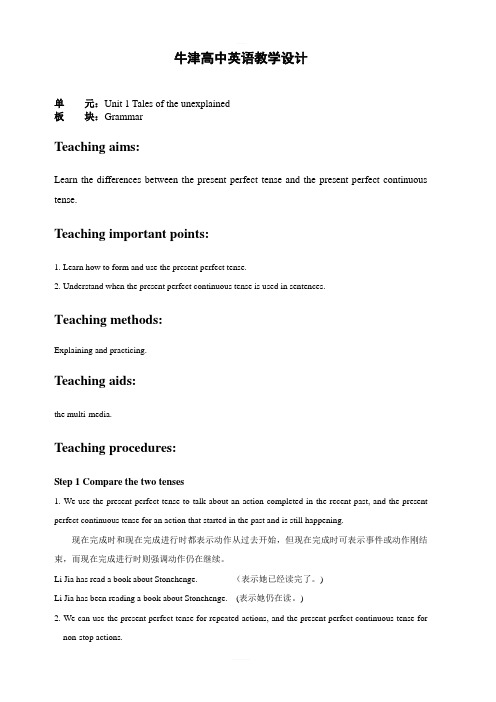
牛津高中英语教学设计单元:Unit 1 Tales of the unexplained板块:GrammarTeaching aims:Learn the differences between the present perfect tense and the present perfect continuous tense.Teaching important points:1. Learn how to form and use the present perfect tense.2. Understand when the present perfect continuous tense is used in sentences.Teaching methods:Explaining and practicing.Teaching aids:the multi-media.Teaching procedures:Step 1 Compare the two tenses1. We use the present perfect tense to talk about an action completed in the recent past, and the present perfect continuous tense for an action that started in the past and is still happening.现在完成时和现在完成进行时都表示动作从过去开始,但现在完成时可表示事件或动作刚结束,而现在完成进行时则强调动作仍在继续。
Li Jia has read a book about Stonehenge. (表示她已经读完了。
)Li Jia has been reading a book about Stonehenge. (表示她仍在读。
)2. We can use the present perfect tense for repeated actions, and the present perfect continuous tense for non-stop actions.We usually use the present perfect tense to ask questions beginning with how many/much, and the present perfect continuous tense to ask questions beginning with how long.现在完成时可表示反复发生的动作,提问时用how many / how much。
高中英语精品公开课高一英语牛津译林版2020 必修二 Unit1Grammar and usage

behind the scenes
1. 在后台,在幕后 2. 大量的艰辛工作 3. 给某人作简单介绍 4. 对…熟悉 5. 首先 6. 吸引某人的注意力于 7. 重视,认为…重要 8. 视觉特效 9. 把…和…分开 10. 使某人能够做
behind the scenes a huge amount of hard work
1. 在后台,在幕后 2. 大量的艰辛工作 3. 给某人作简单介绍 4. 对…熟悉 5. 首先 6. 吸引某人的注意力于 7. 重视,认为…重要 8. 视觉特效 9. 把…和…分开 10. 使某人能够做
behind the scenes a huge amount of hard work give sb. a brief introduction to be familiar with to begin with draw one’s attention to
1. 在后台,在幕后 2. 大量的艰辛工作 3. 给某人作简单介绍 4. 对…熟悉 5. 首先 6. 吸引某人的注意力于 7. 重视,认为…重要 8. 视觉特效 9. 把…和…分开 10. 使某人能够做
behind the scenes a huge amount of hard work give sb. a brief introduቤተ መጻሕፍቲ ባይዱtion to be familiar with to begin with draw one’s attention to attach great importance to visual special effects separate A from B enable sb. to do
1. 在后台,在幕后 2. 大量的艰辛工作 3. 给某人作简单介绍 4. 对…熟悉 5. 首先 6. 吸引某人的注意力于 7. 重视,认为…重要 8. 视觉特效 9. 把…和…分开 10. 使某人能够做
译林牛津版高中英语模块二短语、词汇语法归纳汇总

译林牛津版高中英语模块二短语、词汇语法归纳汇总Unit 1 Tales of the Unexplained一、Reading1. run into sth: 偶然遇见;撞到;遭遇①The car ran into a tree all of a sudden.②I have run into debt for a long time.2. step up sth: 增加;加快;加强Step up production.3. go missing: 失踪When loved ones go missing, hope is "the only thing you have left".亲人失踪时,希望是你留下的唯一的东西。
4. due: adj. 因为;预期的;到期的;适当的due to sth: 因为……be due to do sth: 预定∕预期……fall / become / be due: 到期in due course: 在适当时期①The team’s success is largely due to his efforts.②His book is due to be published in October.③My house rent isn’t due until Wednesday.④Your request will be dealt with in due course.5. search: vt. & n.搜寻,搜查search for sth: (=look for sth) 寻找……search sth for sth: 搜查……以寻找……search sth out: 查出∕找出……in search of sth: 寻找……①search the woods for escaped prisoners.②We have searched out several your favorite recipes.③Scientists are in search of a cure for the disease.6. witness: (1) n. 目击者;证人be witness to sth: 目击∕证实……We were witness to the accident.(2) vt.目击,见证This year has witnessed the rapid development of China’s economy.7. put on sth: (1) 穿上:put on your coat (2) 播放:put on a record(3) 上演,举行:put on a concert (4) 增加:put on weight8. Standing inside lots of strange creatures wit white……(Page 2, Lines 36-38)表示方位的副词、名词短语、形容词短语、介词短语放在句首,而且主语是名词时,句子完全倒装。
译林版高中英语选择性必修二Unit1 Grammar and usage 练习(雅礼版)

选择性必修二Unit 1 The mass media语法补充练习:过去完成时一、过去完成时的应用1.与过去完成时连用的时间状语可以多种多样,使用它的主要依据是看其是否发生在“过去的过去”。
在来这儿之前我学过一些英语。
I had learned some English before I came here.到去年他已经写了三篇故事。
He had written three stories by the end of last year.当他到那儿时,我们已经把房子弄干净了。
We had cleaned the house when he got there. 2.过去完成时还经常用于主句为过去时的宾语从句中。
他说他当过兵。
He said he had been a soldier.3. 动词expect, hope, suppose, think, want等的过去完成时可用来表示未实现的计划、打算或希望。
我本希望来看你。
I had hoped to visit you, but...他本想在北京买栋房子。
He had meant to buy a house in Beijing, but ...4.用于下列4个特殊句型中:1)hardly … when … , / no sooner … than …2)It/ That /This was the first time that …3)It was+时间段+since …4)… than sb. had thought /expected /hoped /wanted等。
我刚开开门,他就告诉了我。
Hardly had I opened the door when he told me the news.他刚买了这辆车,转眼又卖了。
No sooner had he bought the car than he sold it.这是他第二次和她一道出去。
译林牛津版高中英语M2 U1 Grammar and usage
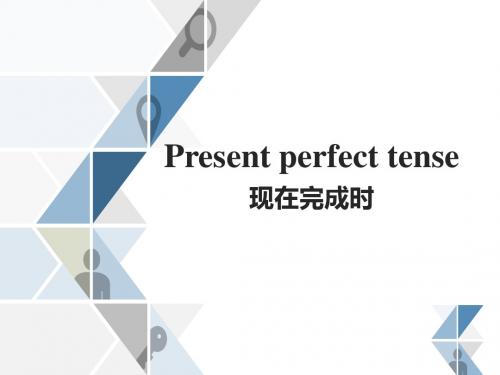
Step 3. Practice
Event:
be the senior high school students
1. We have been (be) senior high school students for four months.
Step 3. Practice
Event:
2. We have learned ( learn) many English words by now.
Tense
Aspect definition:
[U, C] (grammar) the form of a verb that shows, for example, whether the action
① happens once / repeatedly ② is completed / still continuing
learn many English words
Step 3. Practice
3.
Canada has arrested
(arrest) Huawei CFO
Meng Wanzhou( 孟 晚
舟)【, which has received
great concern】.
Event:
Non-restrictive attributive clauses 非限定性定语从句
Step 6. Homework
1. Workbook C1, C2 (P88)
2. Preview present perfect continuous tense (P9)
2.Have you heard the song PPAP?
Step 2-2. Present perfect tense - Form
译林牛津高一模块二第一单元语言点详析
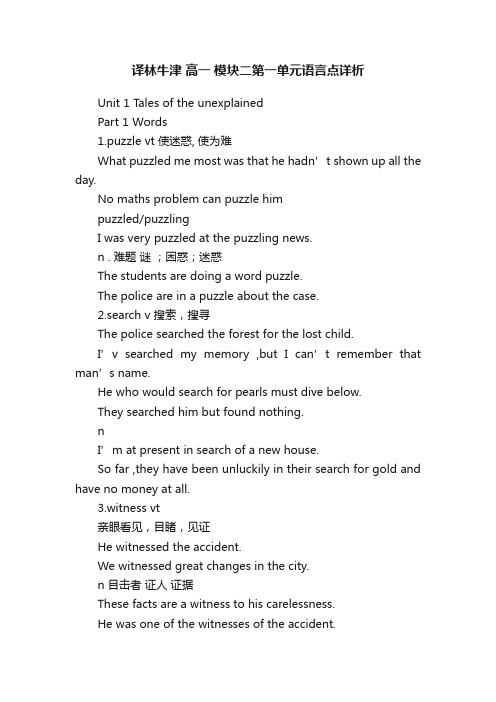
译林牛津高一模块二第一单元语言点详析Unit 1 Tales of the unexplainedPart 1 Words1.puzzle vt 使迷惑, 使为难What puzzled me most was that he hadn’t shown up all the day.No maths problem can puzzle himpuzzled/puzzlingI was very puzzled at the puzzling news.n . 难题谜;困惑;迷惑The students are doing a word puzzle.The police are in a puzzle about the case.2.search v 搜索,搜寻The police searched the forest for the lost child.I’v searched my memory ,but I can’t remember that man’s name.He who would search for pearls must dive below.They searched him but found nothing.nI’m at present in search of a new house.So far ,they have been unluckily in their search for gold and have no money at all.3.witness vt亲眼看见,目睹,见证He witnessed the accident.We witnessed great changes in the city.n 目击者证人证据These facts are a witness to his carelessness.He was one of the witnesses of the accident.4researchvNowadays the scientists are busy researching into/on our surroundings.The doctors researched into/on the cause of his death ,but no luck.ndo /make carry out research into /on sth5.case n 案子,案件;事情;箱子in this case 如果这样in that case 如果那样in case 以防万一in no case 决不in any case 无论如何6. charge1)n 负责责任After his father died ,he took charge of the firm ,and now he is in charge of the firm ;that’s to say ,the firm is in the charge of him.2) n /vt 收费,要价You can visit the exhibition free of charge.How much do you charge me for the use of telephone?3) 控告使担责任The court charged him with murder.7 murder vt /n 谋杀凶杀He was charged with an attempted murder.He was murdered on a cold evening.He murdered the whole work .n murderer 杀人者凶手8 convince vt使相信;信服;说服He convinced me that I should study law.He convinced me of his honesty.convinced /convincingPeople became convinced that they should prevent rivers from being polluted.You should give convincing evidence to make yourself convinced.9 disappoint vtWe shouldn’t do anything that will disappoint our parents.What disappointed me most was that I couldn’t go home .disappointed/disappointingHe was disappointed at the news that our team was defeated.The weather is disappointing.He is a disappointing man; nobody would like to stay with him.10. lately =recently多用于否定和疑问句]近来, 最近I haven't seen him lately.Have you been there lately ?注意:be late for school (adj)get up late (adv)11.mystery n 神秘Yesterday I read a story of mystery.Many problems that used to be mysteries to people are now solved.mysterious adj. 神秘的12.support vt 支撑,支持;搀扶;赡养She supports her husband on the money she earns from teaching.He has a large family to support.Don’t worry ! I support you .Which football team do you support?nDuring that election ,he won much support.13. exist viOne cannot exist without air.人没有空气就不能生存。
牛津译林版高中英语必修二Unit 1Grammar and usage
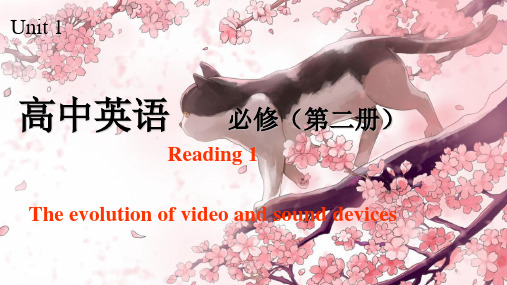
Discussion
Case 5: Two hours seems …
Explanation: “two hours” refers to a unit of time singular
verb
Practice (1) Three hundred miles __is____ (be) a great
Explanation: A verb-derived -ing form phrase referring to one activity singular verb Extension: Two verb-derived -ing forms/infinitives connected with an “and” but referring to one thing singular verb
computer was
The Jungle Book lasts
there is enough tension and humour
Two hours seems
Discussion Case 1: its film team members were
Explanation: its film team members (subject) were (plural verb) Extension: collective noun “team” “team” referring to all the members of the team plural verb “team” referring to the team as a whole entity singularactice (1) This team __i_s_______ (be) the best in this city. (2) The team __a_r_e_d_r_iv_i_n_g___ (drive) to the game in their own cars
牛津译林版高中英语必修二《Unit 1 Tales of the unexplained》Grammar and usage 同步练习
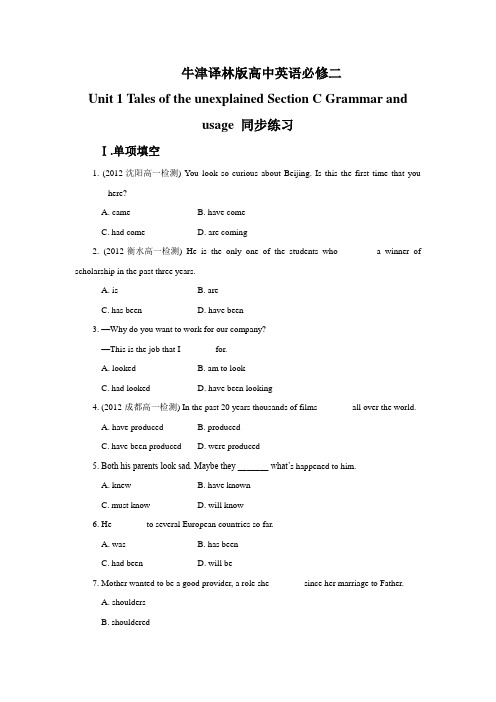
牛津译林版高中英语必修二Unit 1 Tales of the unexplained Section C Grammar andusage 同步练习Ⅰ.单项填空1. (2012·沈阳高一检测) You look so curious about Beijing. Is this the first time that you _______ here?A. cameB. have comeC. had comeD. are coming2. (2012·衡水高一检测) He is the only one of the students who _______ a winner of scholarship in the past three years.A. isB. areC. has beenD. have been3. —Why do you want to work for our company?—This is the job that I _______ for.A. lookedB. am to lookC. had lookedD. have been looking4. (2012·成都高一检测) In the past 20 years thousands of films _______ all over the world.A. have producedB. producedC. have been producedD. were produced5. Both his parents look sad. Maybe they _______ what’s happened to him.A. knewB. have knownC. must knowD. will know6. He _______ to several European countries so far.A. wasB. has beenC. had beenD. will be7. Mother wanted to be a good provider, a role she _______ since her marriage to Father.A. shouldersB. shoulderedC. is shoulderingD. has been shouldering8. The famous writer _______ one new book in the past two years.A. is writingB. was writingC. wroteD. has been writing9. Zhao Lan _______ already _______ in this school for two years.A. was;studyingB. will;studyC. has;studiedD. are;studying10. Harry Potter is a very nice film. I _______ it twice.A. will seeB. have seenC. sawD. see11. Every possible means _______ to prevent the crash, but the computer still doesn’t work.A. is tiredB. are triedC. has been triedD. have been tried12. —These farmers have been to the United States.—Really? When _______ there?A. will they goB. did they goC. do they goD. have they gone13. His father _______ the Party since 1978.A. joinedB. has joinedC. was inD. has been in14. Miss Green isn’t in the office. She _______ to the library.A. has goneB. wentC. will goD. has been15. —Why, Jack, you look so tired!—Well, I _______ the house and I must finish the work tomorrow.A. was paintingB. will be paintingC. have paintedD. have been painting16. (2011·北京高考) Tom _______ in the library every night over the last three months.A. worksB. workedC. has been workingD. had been working17. (2011·陕西高考) His first novel _______ good reviews since it came out last month.A. receivesB. is receivingC. will receiveD. has received18. (2011·安徽高考)—I didn't ask for the name list. Why _______ on my desk?—I put it there just now in case you needed it.A. does it landB. has it landedC. will it landD. had it landed19. (2012·湖南高考) —I remember you were a talented pianist at college. Can you play the piano for me?—Sorry, I _______ the piano for years.A. don’t playB. wasn’t playingC. haven’t playedD. hadn’t played20. (2012•安徽高考) In order to find the missing child, villagers _______ all they can over the past five hours.A. didB. doC. had doneD. have been doing21. (2012·全国卷Ⅱ) The manager _______ the workers how to improve the program since 9 am.A. has toldB. is tellingC. has been tellingD. will have told22. (2011·湖南高考) It is the most instructive lecture that I _______ since I came to this school.A. attendedB. had attendedC. am attendingD. have attended23. (2010·全国卷Ⅰ) When you are home, give a call to let me know you _______ safely.A. are arrivingB. have arrivedC. had arrivedD. will arriveⅡ.用所给动词的适当形式填空1. The aliens say they come from Zeon and _______ (travel) for 2 years.2. How many times _______ you _______(swim) in the sea?3. They _______(visit) this national park twice this month.4. They _______(tour) Paris for 2 weeks. They are going back home next week.5. Jim _______(read) a book about the Loch Ness Monster this morning, and he’ll get through soon.6. But no evidence of life _______ (discover) in any of these planets so far.7. She _______ never _______(read) any book about Stonehenge before.8. I _______(not be) so delight since I _______ (enjoy) myself last.Ⅲ.单句改错1. All these years they are contributing articles to our magazine._________________________________________2. I have been drinking five cups of coffee this afternoon._________________________________________3. What have you been doing before you left Oxford?_________________________________________4. It’s a good job. Have you done it all by yourself?_________________________________________5. It’s a long time since you come to see me._________________________________________6. Alice didn’t see much of Henry lately._________________________________________7. I’m glad to tell you that you passed the exam._________________________________________8. The little boy is wet all over because he played all the morning._________________________________________答案与解析Ⅰ. 1. B 句意:你看上去对北京这么好奇,这是你第一次来这儿吗?This/That/It is the first(second…) time that…句型中,从句多用现在完成时。
高中英语牛津译林版必修第二册 unit1 grammar and usage课件

two hours
11
• When not only … but also … is used as the subject of a sentence, or there be is followed by two or more nouns as the subject of a sentence, the verb agrees with the noun closest to it. Such paired conjunctions include: either…or…; neither…nor…; not…but… eg Not his parents but she doesn’t want to go there. Neither you nor I am right. Not only the students but also the teacher likes this holiday. There is a pen and several pencils in the box.
5
Building the jungle environment on the computer was no easy job. It took more than 800 artists over a year to work on the project. The Jungle Book lasts for about two hours but there is enough tension and humour to hold your attention during the whole film. Two hours seems very short when you’re having so much fun!
译林版高中英语选必二Unit1 Grammar and usage (II) 教案(雅礼版)
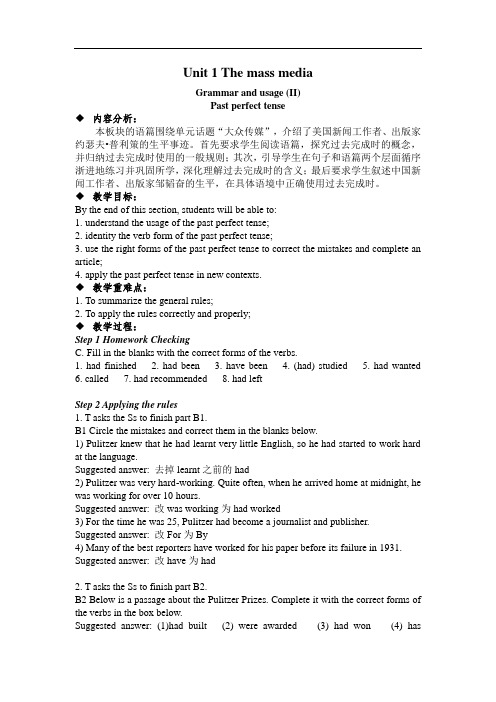
Unit 1 The mass mediaGrammar and usage (II)Past perfect tense◆内容分析:本板块的语篇围绕单元话题“大众传媒”,介绍了美国新闻工作者、出版家约瑟夫•普利策的生平事迹。
首先要求学生阅读语篇,探究过去完成时的概念,并归纳过去完成时使用的一般规则;其次,引导学生在句子和语篇两个层面循序浙进地练习并巩固所学,深化理解过去完成时的含义;最后要求学生叙述中国新闻工作者、出版家邹韬奋的生平,在具体语境中正确使用过去完成时。
◆教学目标:By the end of this section, students will be able to:1.understand the usage of the past perfect tense;2.identity the verb form of the past perfect tense;e the right forms of the past perfect tense to correct the mistakes and complete an article;4.apply the past perfect tense in new contexts.◆教学重难点:1.To summarize the general rules;2.To apply the rules correctly and properly;◆教学过程:Step 1 Homework CheckingC.Fill in the blanks with the correct forms of the verbs.1. had finished2. had been3. have been4. (had) studied5. had wanted6. called7. had recommended8. had leftStep 2 Applying the rules1. T asks the Ss to finish part B1.B1 Circle the mistakes and correct them in the blanks below.1) Pulitzer knew that he had learnt very little English, so he had started to work hard at the language.Suggested answer: 去掉learnt之前的had2) Pulitzer was very hard-working. Quite often, when he arrived home at midnight, he was working for over 10 hours.Suggested answer: 改was working为had worked3) For the time he was 25, Pulitzer had become a journalist and publisher. Suggested answer: 改For为By4) Many of the best reporters have worked for his paper before its failure in 1931. Suggested answer: 改have为had2. T asks the Ss to finish part B2.B2 Below is a passage about the Pulitzer Prizes. Complete it with the correct forms of the verbs in the box below.Suggested answer: (1)had built (2) were awarded (3) had won (4) hasbeen allowed (5) had intended3. After finishing the box, T asks the Ss to answer the following questions:1) Who had devoted a lot before The Pulitzer Prizes were established?Suggested answer: Joseph Pulitzer.2) What categories have The Pulitzer Prizes also expanded to include?Suggested answer: Photography and music.【设计意图:这个步骤是这堂课的核心部分,将语法知识和语境相结合,在语境中学习语法知识。
Unit1 单词讲解-高二英语牛津译林版选择性必修第二册
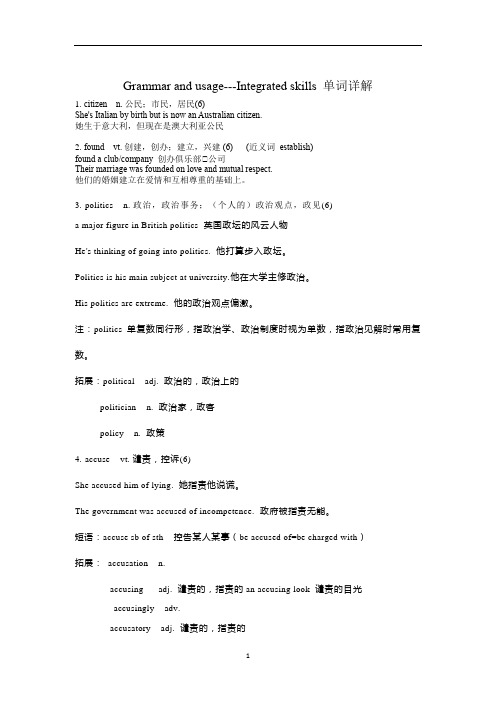
Grammar and usage---Integrated skills 单词详解1.citizen n.公民;市民,居民(6)She's Italian by birth but is now an Australian citizen.她生于意大利,但现在是澳大利亚公民2.found vt.创建,创办;建立,兴建(6) (近义词establish)found a club/company 创办俱乐部╱公司Their marriage was founded on love and mutual respect.他们的婚姻建立在爱情和互相尊重的基础上。
3.politics n. 政治,政治事务;(个人的)政治观点,政见(6)a major figure in British politics 英国政坛的风云人物He's thinking of going into politics. 他打算步入政坛。
Politics is his main subject at university.他在大学主修政治。
His politics are extreme. 他的政治观点偏激。
注:politics单复数同行形,指政治学、政治制度时视为单数,指政治见解时常用复数。
拓展:political adj. 政治的,政治上的politician n. 政治家,政客policy n. 政策4.accuse vt. 谴责,控诉(6)She accused him of lying. 她指责他说谎。
The government was accused of incompetence. 政府被指责无能。
短语:accuse sb of sth 控告某人某事(be accused of=be charged with)拓展:accusation n.accusing adj. 谴责的,指责的an accusing look 谴责的目光accusingly adv.accusatory adj. 谴责的,指责的accused adj. 被控告的the accused 被告5.tax n. 税,税款vt. 对…征税,使纳税(6)to raise/cut taxes 增加╱削减税收to pay over £1 000 in tax 缴纳1 000多英镑的税款profits before/after tax 税前╱税后利润a tax on cigarettes 香烟税His declared aim was to tax the rich. 他宣布他的目的是向富人征税。
Unit2Grammar动词不定式做定语和结果状语讲义高中英语牛津译林版(1)

语法图解语法精讲Grammar 动词不定式做定语和结果状语不定式是动词的非谓语形式之一,具出名词、形容词、副词的性质,在句子中可以充当主语、宾语、表语、定语、状语和补足语。
动词不定式没有人称和数的变化,但有时态和语动词不定式做定语时应放在被修饰词的后面。
常用于以下情形:(1)动词不定式做定语表示将来的还没有发生的动作。
There are many problems to be solved before we are alreadyfor a long stay on the moon.在我们预备长时间待在月球上之前,还有很多要处理的问题。
We're to hold a meeting half an hour. The decision to be made at the meeting will influence the future of our pany.我们半小时后将要进行一个会议。
会议上做出的打算将影响我们公司的末来。
(2)序数词、形容词最高级或the last/the only/the very等后常用不定式做定语。
He was the best man to do the job. 他是做这个工作的最正确人选。
He is always the first to e and the last to leave.他总是第一个来,最终一个走。
He is the only one to win the game.他是唯一—个赢得这场竞赛的人。
(3)抽象名词time, way,reason,chance, ability, promise 等后常用不定式做定语。
He made a promise to e here on time tomorrow.他许诺明天按时来这儿。
Interest is as vital to learning as the ability to understand,even more so.爱好对于学习米说,同理解力量一样职要,甚至更蛋要。
高中英语 模块二 unit1 Grammar and usage 2课件 译林牛津必修2

(swim) in the lake?
• How long _h_a_v_e_ you _b_e_e_n_s_w_i_m__m_i_n_g_
(swim) in the lake?
4.We can use either a state verb or an action verb with the present perfect tense but we usually can only use an action verb with the present perfect continuous tense.
month. (repeated actions)
• I _h_a_v_e__b_ee_n__t_o_u_ri_n_g_ (tour) Egypt for two
months. (non-stop action)
3.We usually use the present perfect tense to ask questions beginning with how many or how much, and the present perfect continuous tense to ask questions beginning with how long .
Unit 1
Grammar and usage
Present perfect or present continuous?
Present perfect or present perfect continuous?
1.We use the present perfect tense to talk about an action completed in the recent past, and the present perfect continuous tense for an action that started in the past and is still happening.
英语必修ⅱ译林牛津版unit1 grammar课件汇总
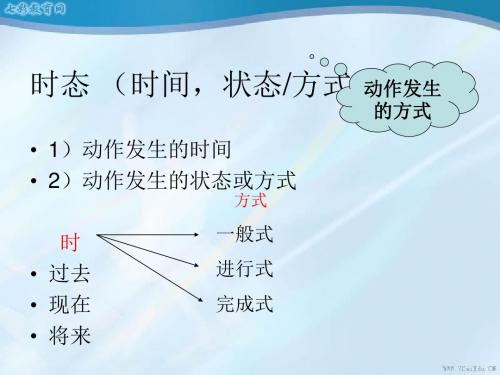
2 They _____ to the south in 1990 and they _________ moved there lived since then. (move, live) have
3 Eric left ____home last year and has ____________back. just come (leave, just come) 4 My brother _____ to see my grandpa last week. He went __________ him three times this month. (go, visit) has visited
时态 (时间,状态/方式) 动作发生
的方式
• 1)动作发生的时间 • 2)动作发生的状态或方式
方式
时 • 过去 • 现在 • 将来
一般式
进行式
完成式
• 时态题解题方法 • 1)找时间 (找时间状语,根据时间状语来 思考,没有时间状语就要注意该动词的时间 与其它动词作对比或考虑其暗含时间。 ) • 2)判断动作发生的方式状态。 • 一般现在经常性,一般过去次常性。 • 先完成,后将明,同步正在是进行。
Present perfect tense
Go through the passage on Page 2
and underline the sentences using
present perfect tense.
Key sentences:
• Police in American have stepped up their search for a fifteen-year-old boy… • The incident has received great interest …… • I haven’t seen Justin since. • …who has taken charge of the case. • So, while we have not dismissed the idea, ……
牛津译林版高中英语必修二模块二unit1Grammarandusage1

Step 3 Read the diary entry and then complete it using the correct forms of the verbs in brackets.
5. We can also use the present perfect tense forrepeated actions, that is, we use the present perfect tense with the time expressionsonce / twice / three times…
Kelly: Sorry I’m late. Have you been
waiting long?
Mavis: Yes. I’ve been waiting for an hour.
past______M__a_vi_s_s_ta_r_te_d_w_a_i_tin_g__fo_r_K_e_l_ly_. ____K_e_ll_y arrives.
recently since yet
Exercise: complete the following sentences with the
proper tense:
(1) We _h_a_v_e__s_tu__d_ie__d(study) English for about five
years.
(2) They _h_a_v_e__li_v_e_d_(live ) in the south since their
daughter was born.
(3) I _h_a_v__e_r_e_a_d_(read) your article three times. It’s
高中译林牛津英语模块二Unit1grammar

• He has died.
• He has been died for one year.
• He has been dead for one year.
注意:非延续性动词的否定形式可以与表示 延续时间的状语连用。即动作不发生的状态 是可以持续的。 判断正误:
(F )I’ve got his letter for a month. (T )I got this letter a month ago. (T)I haven't received his letter for
A. was B. have been C. came D. am coming (2) ---Have you _D___ been to our town before? ---No, it's the first time I ___ here. A. even, come B. even, have come C. ever, come D. ever, have come
• 6 The police_h_a_v_e_f_in_i_s_h_e_d_ ( finish) searching the area.
现在完成时与一般过去时的区别:
• 一般过去时表示发生在过去的 动作,和现在无关;现在完成 时则强产 生的结果或影响等。
• 2 Eric __l_e_ft___ (leave) home last
year and h_a_s__ju_s_t_c_o_m_e_ (just come)
back.
• 3 Justin __h_a_s_b_e_e_n__ (be) away
from home for several days. He
通常使用现在完成时的几种情况:
英语-高中-必修2-牛津译林版-Unit 1-Grammar课件(共40张PPT)

2.___C___I can pay back the help that people give me
makes me very happy.
A. Where B. What C. That
D. How
Object Clause宾语从句
• 在另一个句子中做宾语的句子叫宾语从 句。
宾语从句在句中充当宾语成分( 可以作谓 语动词、介词、形容词等的宾语)
2.连接代词:what, whatever, who, whoever, whom, whose, which.不仅 起到连接一个句子的作用,同时也 充当从句的主.宾.表.定语成分。
3.连接副词:when, where, how, why 做状语。
名词性从句的引导词:
1.连接词 :that、if、whether
名词性从句
Noun Clauses
Warm-up
• The structure of the sentence
Lily, my sister, is a good girl, and
SA
V
P
she likes music.
SV O
Conclude: A noun can be a subject, object, predictive and apposition of a sentence.
•
S
V
• Whoever comes is welcome.
•
S
V
• Whether he’ll come here isn’t
clear.
S
V
• Wherever you are is my home –
•
S
VP
- 1、下载文档前请自行甄别文档内容的完整性,平台不提供额外的编辑、内容补充、找答案等附加服务。
- 2、"仅部分预览"的文档,不可在线预览部分如存在完整性等问题,可反馈申请退款(可完整预览的文档不适用该条件!)。
- 3、如文档侵犯您的权益,请联系客服反馈,我们会尽快为您处理(人工客服工作时间:9:00-18:30)。
一般过去时还是现在完成时?
• 1 They _______ (move) to the moved south in 1990 and ________ have lived (live) there since then. • 2 Eric _______ (leave) home last left just come (just come) year and has ___________ back. has been • 3 Justin __________ (be) away from home for several days. He disappeared __________(disappear) last
现在完成时在时间或条件状语从句 中的用法:
• 现在完成时在时间或条件状语从句中 可以表示强调。
• 1. I’ll give you the book as soon have finished (finish) it. as I ___________ have seen • 2. If you ___________ ( see) the film, you will like the director.
• 现在完成时的时间状语: • for, since, already, yet, so far, up to now, ever, never, recently, lately, just, in the past … years,等,皆不确定的 时间状语。
延续性与非延续性动词:
• 延续性动词常与for, how long, since 等引导的表示一段时间的状 语或状语从句连用。一些非延续性 动词如come, go, leave, die, join, marry 等如用于现在完成时,一般 不可以与表示一段时间的时间状语 连用,此时应改为意义相近的延续 性动词来表达。
现在完成进行时(Present perfect continuous tense): The first usage: 现在完成进行时表示强调某一动 作在过去开始发生,已经持续到 现在,并且还将持续;(持续性)
• 1. I have been learning English for three years. • 2. He is very tired, because he has been cleaning the room.
2.或动作刚刚停止,但与现在有关。 He is very tired, because he has been cleaning the room.
Kelly: Sorry, I’m late. Have you been waiting long? Mavis: Yes. I’ve been waiting for an hour.
bought • 4 They _________(buy) this house three years ago and they __________ have lived (live) here since then. 5 My brother ______ went (go) to see my grandpa last week. He has visited (visit) him three _________ times this month.
(state verb)
• I have been taking photos of UFOs (action verb) these days.
动作动词(action verb) 与状态动词(state verb) • An action means something happening or changing. A state means something staying the same. Some examples of action verbs are do, go, and play. Some examples of state verbs are have, keep, know, be, stay.
Read the diary entry on Page 8 and complete it using the correct forms of the verbs in brackets.
• (2) saw (3) has visited (4) loves (5) hasn’t visited (6) has swum (7) has never met (8) has dived (9) has found (10) hasn’t found (11) Has, been
• 2)This is +形容词最高级 +that…结构,that 从句要用现 在完成时。例如: This is the best film that I ha ve seen _____ ever ______ (see).
• 典型例题
(1) ---Do you know our town at all? B here. ---No, this is the first time I ___ A. was B. have been C. came D. am coming D (2) ---Have you ____ been to our town before? ---No, it's the first time I ___ here. A. even, come B. even, have come C. ever, come D. ever, have come
Complete the following sentences with the proper tense.
have studied • 1 We _____________ (study) English for about five years. have lived • 2 They ______________ (live) in the south since their daughter was born. have read • 3 I ___________ (read) your article three times. It’s well written.
现在完成时与一般过去时的区别: • 一般过去时表示发生在过去的 动作,和现在无关;现在完成 时则强调某一发生在过去的动 作与现在的关系,如对现在产 生的结果或影响等。
完成下列句子:
I _______(see) this film yesterday. (强 saw 调看的动作发生过了) I ____________ have seen (see) this film. (强调 对现在的影响,电影的内容已经知道了) has been (be) in the League for He __________ three years. (在团内的状态可延续) He ________ joined (join) the League three years ago. (强调加入的动作发生在过 去)
• 二 . 现在完成时可以用表示状 态的动词(state verb)或表示动 作的动词(action verb)做谓语, 而现在完成进行时则只能用表 示动作的动词(action verb)做 谓语。
• I have had his book for two months. • I have already taken the photos of (action verb) UFOs.
• He has died. • He has been died for one year. • He has been dead for one year.
注意:非延续性动词的否定形式可以与表示 延续时间的状语连用。即动作不发生的状态 是可以持续的。 判断正误:
(F )I’ve got his letter for a month. (T )I got this letter a month ago. T ( )I haven't received his letter for almost a month.
通常使用现在完成时的几种情况:
1 表示发生在过去对现在仍有影响的动作。 I have read the book. 2 表示过去发生一次或多次的动作。 We all have played football. 3 表示过去开始的动作一直延续到现在,只 能用于某些带有延续意义的动词,常与for, since, so far 等连用。 He has taught here since ten years ago.
•
现在完成进行时的构成:
have/ has been + doing
现在完成时和现在完成进行时的区别:
• 比较以下句子: 一. 现在完成时表示事件或动作刚结 束,而现在完成进行时则强调动作一 直在做而且仍在继续。 1. I have read the book written by you. 2. I have been reading the book written by you this month.
作) have worked(work) here for many I ___________
years.(现在我仍在这里工作)
用于现在完成时的特殊句型 1)It is the first / second time.... that…结构中的从句部分,用现在 完成时。例如: have visited It is the first time that I _________ (visit) the city. This is the first time that I ____________ (hear ) him sing. have heard 注意:It was the third time that the boy had _______ been (be) late.
